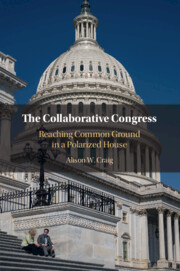Book contents
- Frontmatter
- Dedication
- Contents
- Figures
- Tables
- Acknowledgments
- 1 Collaboration in Congress (Yes, It Exists!)
- 2 Social Exchange in Congress
- 3 Identifying Policy Collaboration
- 4 The Breadth and Substance of Collaborative Issues
- 5 The Most (and Least) Collaborative Members of Congress
- 6 The Interdependence of Collaborative Relationships
- 7 Legislative Benefits of Collaboration
- 8 The Future of Collaboration
- Appendix A Interview Notes
- Appendix B Model Specifications and Fit
- References
- Index
2 - Social Exchange in Congress
Published online by Cambridge University Press: 05 October 2023
- Frontmatter
- Dedication
- Contents
- Figures
- Tables
- Acknowledgments
- 1 Collaboration in Congress (Yes, It Exists!)
- 2 Social Exchange in Congress
- 3 Identifying Policy Collaboration
- 4 The Breadth and Substance of Collaborative Issues
- 5 The Most (and Least) Collaborative Members of Congress
- 6 The Interdependence of Collaborative Relationships
- 7 Legislative Benefits of Collaboration
- 8 The Future of Collaboration
- Appendix A Interview Notes
- Appendix B Model Specifications and Fit
- References
- Index
Summary
Chapter 2 presents a theory of why members choose to collaborate – often with unlikely allies – in a polarized and conflict-prone legislature. Drawing on organizational theory, collaboration is clearly defined as members of Congress working together toward a shared policy goal. This behavior is then placed in the context of social exchange theory, in which social interactions are viewed as interpersonal exchanges of both tangible and intangible goods. Applying social exchange theory to the US House of Representatives predicts that members of Congress will collaborate when all involved have a common goal and expect that they will be better off working together than going alone. The expected costs and benefits of collaboration are informed by previous experiences and interactions, as well the rules and norms of Congress. The social exchange perspective emphasizes collaboration as a function of both self-interest and interdependence. As long as it improves the likelihood of achieving their goals, members will seek to collaborate. Their ability to do so depends on whether they can find a colleague with whom they can reach an agreement for mutual gain.
Keywords
- Type
- Chapter
- Information
- The Collaborative CongressReaching Common Ground in a Polarized House, pp. 18 - 43Publisher: Cambridge University PressPrint publication year: 2023

